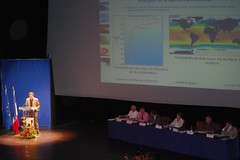 8 July 2008 - 14:00
8 July 2008 - 14:00Towards sustainable energy and energy autonomy
In line with the “ambitious” Reunion Island approach, several representatives from Reunion Island have outlined a green energy revolution to bring about a radical change in the energy and resource demands of Reunion Island.
Jean-Francois Lhuissier, deputy director, systèmes energétiques insulaires, EDF, pointed to the potential of island states, particularly Reunion, to incorporate all existing renewable energy technologies into the energy supply.
Reunion currently gets around 30 percent of its energy from hydropower and biomass, but remains heavily reliant on oil for its energy demands, according to Lhuissier. Hampering efforts to improve this situation included problems with frequency and voltage disturbances, energy storage problems and funding, he explained.
Addressing these issues, and the basics of food safety and guarantee of water supply, was vital for implementing new initiatives on Reunion, stressed Laurent Gautret, technical director, Agence Régionale de l'Energie Réunion.
He detailed the diverse range of renewable technologies currently available, particularly in 'swell' research, harnessing the power produced in the oceans.
Gautret cited Hawaii's use of ocean thermal power – a 19th Century invention abandoned in the 1980s whereby cold water from ocean depths is pumped back to the warmer surface water for energy production. As well as producing up to 8000 kw hours per year, this technology can also be used to produce fresh water through desalination and provide air conditioning.
Caution was raised from Chris Thomas, York University, asking about the life cycle of the renewable projects. He remained skeptical about biomass affecting food security and reducing greenhouse emissions, and ocean thermal technologies threat to reefs and marine eco systems.
Laurent stipulated the “need to be accurate and precise about where we use these technologies,” and reiterated the need to think about food supply as well as energy, highlighting a plan to build greenhouses producing food and energy, with solar panels on top and food inside.
Less is more
This efficiency of energy production also extended to the 'demand side' of energy use, emphasised Christel Thuret, ADEME. She outlined ADEME's 'Negawatt' initiative, whereby energy use and thus the amount required is reduced.
Public awareness campaigns on household products, solar water heaters, green building projects and campaigns to involve and influence importers would continue to contribute to this energy efficiency, said Thuret.
The energy demands of the Reunion Island population continued to grow, with 1 million inhabitants expected by 2030, according to Philippe Berne, regional council of Réunion Island. He outlined PRERURE, the regional renewable energy and energy use plan for Reunion.
“We have all the trump cards in our hands to meet the demands of energy on the island,” said Berne, reiterating the island's target of energy autonomy by 2025. He also emphasised the need to share their knowledge, research and approaches with other island states.
Jean Ballandras, Prefecture of Réunion Island, repeated the need for cooperation with others with the launch of the GERRI project on the island this week. It includes initiatives such as a lite rail system, electric vehicles, renewable energy production, energy storage, town planning, construction and tourism.
“We want the results to be shared as widely as possible,” stated Ballandras.
One for all
The striving for self-sufficiency on islands such as Reunion could mean the isolation of other island states, unable to keep up with developments in renewables. Berne stressed that, “it does not mean that one advances at the detriment of others,” and cited Suriname and Madagascar's cooperation as an example of “co-development”.
A further example of co-development came from an energy initiative representative in French Polynesia, who explained a hotel's successful use of undersea water for air conditioning on one of the islands. This had reduced the hotel's energy bill by 90%, and had subsequently been copied by other developers from abroad such as the Maldives.
Success stories such as this reveal an inherent silver lining in the otherwise cumulus vulnerability of island states, which Beutin alluded to in his opening remarks,
“Island's economic, environmental and industrial vulnerability is also an asset, because many initiatives can help boost us in using renewables, and pioneer new schemes that are becoming more profitable.”


No comments:
Post a Comment